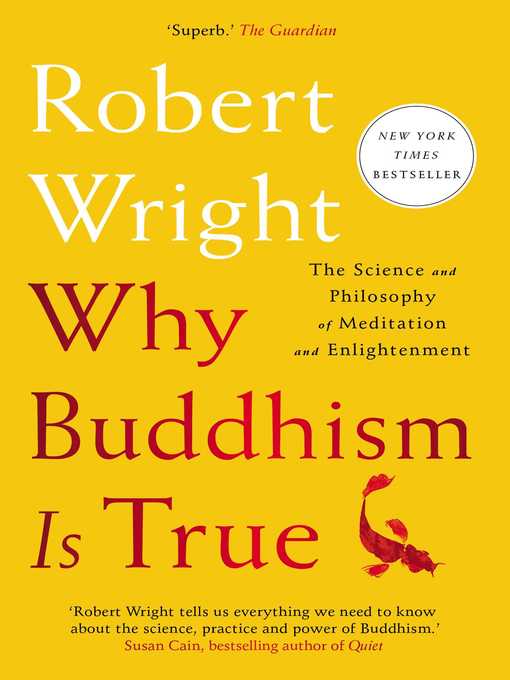
Why Buddhism is True
The Science and Philosophy of Meditation and Enlightenment
کتاب های مرتبط
- اطلاعات
- نقد و بررسی
- دیدگاه کاربران
نقد و بررسی

Starred review from May 8, 2017
Wright (The Moral Animal) fascinates readers with this journey through evolutionary psychology in search of answers to the question of whether Buddhism’s diagnosis of the human condition is true. Rather than conceiving of the self—or the mind, for that matter—as an autocrat, Wright opts for the modular model of mind, in which behavior is shaped by the interplay of networks dedicated to different tasks and situations with conflicting goals. Because there are ultimately many versions of the self (or “no-self”) in the modular model, Wright argues that emotions are far more integral than reason in constructing perceptions and interpretations of the world. He recommends meditation as a process of dispelling the illusions that natural selection has created (which have since gone haywire outside of natural pressures), suggesting that it can be used to interrogate, contemplate, and disengage from the foundation of feelings that color experience. Through mindfulness, Wright says, one can achieve clarity of vision, breaking out of tribalistic notions of thinking to begin helping others and the world. But this is not easy to accomplish, and Wright’s stories about his meditation experiences include his failures, anxieties, and faults. Wright’s joyful and insightful book is both entertaining and informative, equally accessible to general audiences and more experienced practitioners.

June 1, 2017
A bestselling author sets out to improve the world by encouraging mindful meditation.By his bold title, Pulitzer finalist Wright (The Evolution of God, 2009, etc.) means to assert that "the core of Buddhism's assessment of the human condition...its conception of certain basic aspects of how the mind works and of how we can change how the mind works...warrants enough confidence to get the label that the title of this book gives it." The author finds this corroboration in recent developments in psychology and evolutionary biology, contending that current theories suggesting a modular structure for the mind in place of a single executive support the Buddhist doctrine of "not-self." Furthermore, demonstrable distortions of our perceptions of the world, also anticipated by ancient Buddhist thought, originally served valuable evolutionary purposes but are now obsolete and contribute to personal and social dysfunction. Wright puts forth the mindfulness meditation offered by many Buddhist traditions as a means of overcoming our evolutionary-determined and intuitive habits of thinking and of perceiving the physical world and the human condition with greater clarity and compassion. The author aims to make some fundamentally bizarre-sounding doctrines of Buddhism accessible to skeptical and secular readers by offering scientific support for its assertions in simple language and an engaging style. He keeps explicitly religious references and exotic Asian-language terminology to a minimum; no prior familiarity with Buddhist teachings is required. Wright lightens the trek through some challenging philosophical concepts with well-chosen anecdotes and a self-deprecating humor as he discusses the pinnacles and setbacks of his own meditative experiences. While critical readers may take issue with the logic underlying some of his contentions, the author presents a well-organized, freshly conceived introduction to core concepts of Buddhist thought. A cogent and approachable argument for a personal meditation practice based on secular Buddhist principles.
COPYRIGHT(2017) Kirkus Reviews, ALL RIGHTS RESERVED.

June 15, 2017
Given the book's title, you may be surprised to learn that Wright (The Evolution of God) is not a Buddhist. Rather, he is a journalist and author of several best-selling books about science and religion, as well as a practitioner of mindfulness meditation. Here, he shares his journey with mindfulness and links the outcomes of his practice with evolutionary psychology. Wright argues that natural selection conditions humans to experience suffering, one of the foundational tenets of Buddhism. Strong emotions, such as fear, anxiety, and anger, helped our ancestors to survive, and so these survival mechanisms are still genetically part of us and the way we are wired. Reactions based on these emotions cause us to suffer, but meditation can help to control these reactions as one begins to see that these emotions are devoid of any inherent essence. Wright's treatment of key Buddhist concepts, such as nonself or emptiness, may initially seem glib. However, as he develops his argument, it becomes clear that Wright is trying to help readers to deconstruct and then reconstruct these fundamental concepts. VERDICT An important read for anyone interested in practicing meditation but not necessarily interested in becoming an expert in Buddhist philosophy.--Amanda Folk, Ohio State Univ. Libs.
Copyright 2017 Library Journal, LLC Used with permission.

























دیدگاه کاربران